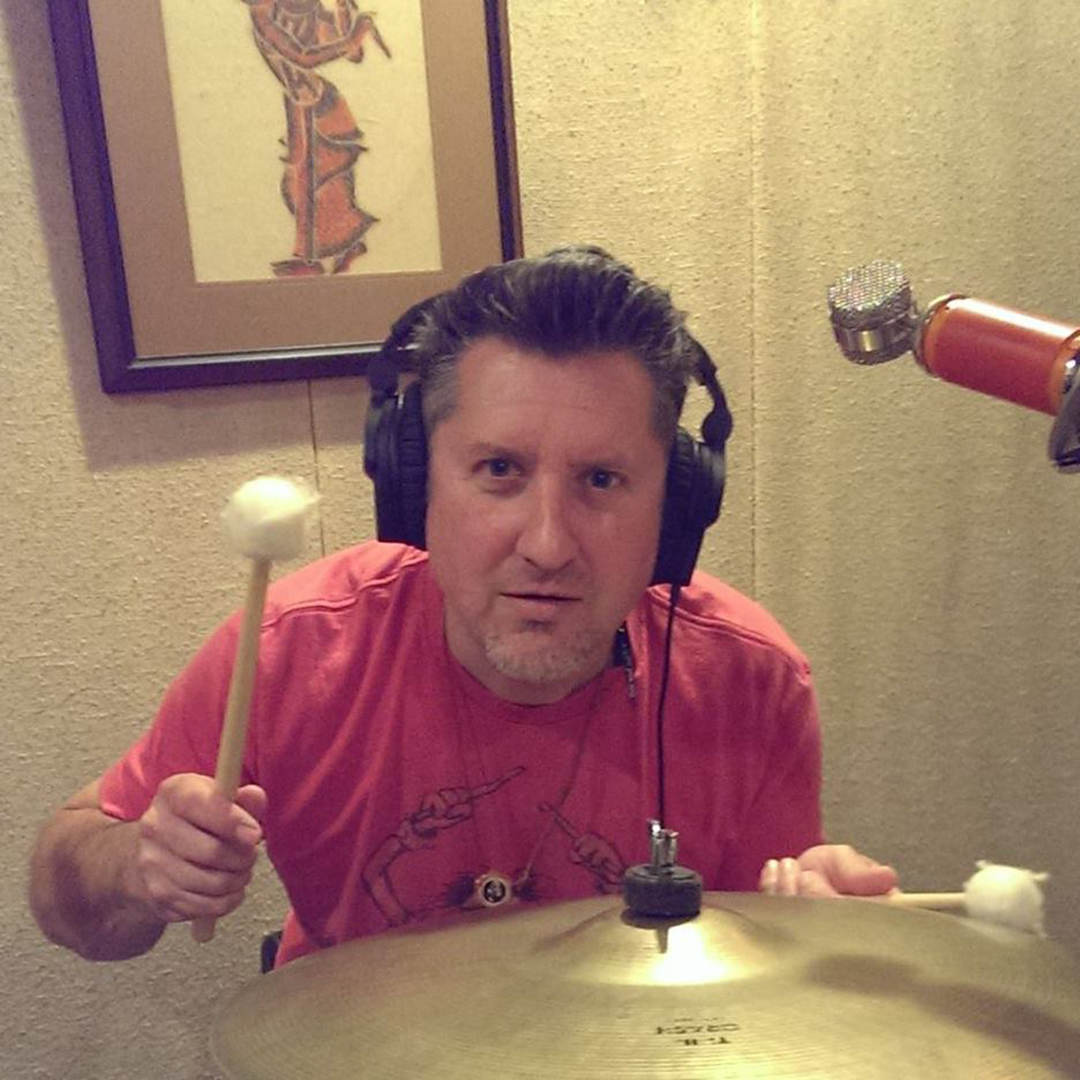The rehearsal room was filled with a variety of instruments. It smelled metallic, like brass and oil or how a penny might taste. The returning music students greeted each other and quickly moved drums, percussion instruments and music stands around the room. It was the first day of school and the first meeting of percussion ensemble.
Class members started taking their places. I was directed to stand behind a set of timpani drums, the large, copper kettle drums used in orchestras. They’re the ones that go bom bom bom bom bom bom bombom bombom bombom at the beginning of “2001: A Space Odyssey.”
A music stand was placed in front of me with sheet music. It was not going to do me any good. I couldn’t read music. I stood there dumbfounded. My face felt hot. My heart rate increased. My guts churned.
Depending on how you look at it, I wasn’t even supposed to be there.
I was accepted to San Diego State as an art major, but I was in a band and wanted keep playing with them, so decided to go Cal Poly Pomona instead. Cal Poly wouldn’t take me as an art major, but they would as a music major. There I was.
After a few awkward minutes, not knowing what to do, I finally said I’ve never played–or touched–a timpani before. Another student asked if I’d like to play a drum set instead.
After some shuffling about, I was sitting behind a Ludwig four-piece in vintage blue oyster pearl, similar to the set Ringo Starr played in the Beatles. Drums felt more comfortable. Maybe this would work out, but soon another music stand appeared, covered in a strange foreign language, which I recognized again as music.
The song I was expected to play was “Blue Rondo A La Turk” by Dave Brubeck. I didn’t know the song at the time–I’m familiar with it now. It’s in 9/8 time, nine beats per measure. Most popular music is in 4/4 time, four beats per measure. At that point in my musical development, 9/8 was beyond my level of understanding.
I wanted it to stop, but they kept pressing. As if everything would snap into place if only the right combination of instruments and sheet music was placed in front of me. It was hopeless.
I don’t know why it wasn’t already obvious to everyone that I didn’t belong in a college music program. It felt like we’d been in there for hours. Fifteen to 20 minutes had passed.
I felt sick and lost. I think I had a stupid grin on my face because it seemed so absurd.
If this was one of those bullshit music biopics, this would be the moment where after a couple awkward miss-starts, everything would quickly turn around and unfold effortlessly into Chapter I: The Ascent.
“It’s goes like this man,” one of the other students would say, and I’d finally “get it.” Soon we’d powering though just like the Dave Brubeck Quartet. Smiles, sweat, high fives and laughter would ensue. Cue the flash forward montage, and jump to a scene on the tour bus and that magic moment in the studio when the first hit was recorded.
This, however, wasn’t a movie. It was Cal Poly.
The professor seemed irritated with me. I don’t recall his exact words, but I think he asked what my problem was.
“I’ve never played music like this before,” I remember saying.
“What do you mean ‘MUSIC—LIKE—THIS?'” he asked, glaring. He slowed down and emphasized each syllable, pushing his tongue and lips extra hard to sharpen each word to a razor-like edge.
If the professor wasn’t irritated with me before, his tone confirmed he was irritated with me now.
You’d think I uttered the name Macbeth in a theater or unleashed some other dark, haunted phrase from an ancient black book of death, unlocking some dark force from the netherworld, a mummy’s curse, sure to bring ruin and destruction.
It seemed obvious I was so lost, I didn’t know how to express it. Couldn’t he see?
Music majors, I found out later, were supposed to audition before being accepted to access their ability to read and play music. This would have saved me a lot of distress because there’s no way I would have passed.
That first quarter felt like a nightmare. I never went back to percussion ensemble. I eventually stopped going to my other classes as well.
The next quarter, I tried other subjects, but I was depressed, and my self esteem was in the toilet. I felt broken.
Nobody went “Whiplash” on my ass, but I felt wronged. Weren’t people supposed to be smart in college? Why did the music professors not immediately recognize me as an imposter and suggest another path?
Looking back, I see I deserved my share of the blame. While they should never should have let me in as a music major, I could have reacted differently. Maybe if I was a musical genius I would have been fine. Just because my experiences in music classes sucked, I didn’t have to give up on everything. If I had been more mature, or more disciplined, I could have risen to the occasion and powered through, but I wasn’t, and I didn’t.
I had just turned 18. My frontal lobes were still developing. I gave up. I’m not saying I was right, but that’s what I did
Before the second quarter was over, I stopped going to classes again. I wasn’t going back next quarter. I decided I was never going back–period.
Even though everybody in my family had at least a master’s degree, after this shitty experience with school I concluded I did not have the capacity to be a good student. I was done with college. I thought it was a scam. So what if never earned a college degree? That was fine with me. I got a job instead.
For 20 plus years, I lived a pretty good life as college dropout. A few times, success seemed to be within reach, but after getting laid off in 2010, lack of a college education started to feel like an obstacle. Jobs I was interested in required a bachelor’s or higher.
In the spring semester of 2011, I signed up for a landscape design class taught at the L.A. County Arboretum.
I know it sounds stupid, but I didn’t understand it was an actual college course. I knew Mt. SAC was involved, but when I found out what I’d signed up for, I almost quit. I still carried that baggage from Cal Poly. I didn’t want to feel that again.
But what choice did I have? I did not see any appealing career options without upgrading my internal software.
I knew nothing about design, drawing to scale or drafting plans, but that seemed to be true of most of the students, so I wasn’t freaked out. Assignments were explained, and I’d go home and try to do them.
Design class turned out to be fun. The professor, Brian Scott, was a cool dude. He was totally positive, and his instructions made sense and were easy to follow. This experience was turning out to be very different from my first time in college.
Class was conversational in tone. While landscape design was not a life long passion, the material was interesting and easy to understand. I did well.
I was cautiously optimistic.
There was a student in class, who I talked to regularly, that didn’t do any of the design assignments. He’d say things like, “I don’t understand this. I don’t know what I’m supposed to do? I can’t do this.”
It’s easy to convince yourself not to try. I think that’s what he was doing. He talked himself out out doing the work because it was easier than risking failure. That’s a card I used to play too.
Even though I didn’t know how to do a design yet either, I tried, and slowly it all started to make sense.
Around that time, it occurred to me. This is the point of going to school.
Nobody started that class already knowing how to design. That’s why we were there. To learn how. It seems obvious now, but I didn’t appreciate it until that moment. School prepares us to face things we’ve never done before and don’t know how to do.
I also began to appreciate how class broadened my awareness.
As I learned about design, drawing to scale and drafting plans, I started to perceive all kinds of things in my surroundings that I could not “see” before. It gave me insight into how the things surrounding us evolve from ideas into physical manifestations of those ideas.
This was just the beginning of what attending Mt. SAC provided. I learned so many things from many wonderful people, lessons that changed my life and that I’ll carry until I die or lose my mind.
In Ashley Haines’ In California History and U.S. History with Ashley Haines, came to appreciate the role mythology plays in history and how it contributes to our understanding of ourselves and our culture.
In Freshman Composition and Critical Thinking and Writing with Edgar Muniz, I was introduced to Postmodernism, Shakespeare, Didion, Foster Wallace and “Synecdoche, New York.” Now I see postmodernism everywhere. I’ve become postmodern obsessed. One day in class, while discussing Shakespeare I got chills and almost cried.
In Fundamentals of Communication, Professor, Julie Laverty, moved us out of our comfort zones with assignments like a performance speech and a flash mob. I dreaded that flash mob, but then I enjoyed it.
In Introduction to Cinema with Peter Churchill I gained appreciation for the depth and meaning in film. I might easily have missed the the brilliance of “M,” “The Third Man,” “McCabe & Mrs. Miller” and “The Shining” if not for his class.
Chris Benoe and Katie Queen helped me understand how to better communicate and tell stories through visual art.
My newsroom family provided so much. Journalism was the source of the most fun–and stress–I had at Mt. SAC. Advisor, Toni Albertson encouraged us to explore, take chances and write more and talk about it less. Jessica Fuller always helped untangle complicated stories and awkward phrasing while keeping things in perspective when they got intense.
Maybe I learned the most from fellow students: Brigette, Angelica, Joliana, Albert, Ferry, Melody, Bret, Josh, John and too many others to name. Their courage and creativity was and is inspiring. They allowed me, at least for a little while, to experience the world through their eyes, and for that, I am forever grateful.
Every class, each semester, expanded the world around me and my understanding of it. All these people, experiences, memories and lessons transformed school from a place I feared and hated into a home.
If not for that shitty experience at Cal Poly, which at the time, I nearly allowed to defeat me, I never would have come to Mt. SAC. I don’t think I could have enjoyed and appreciated school and education if I had made it through the first time.
I certainly wouldn’t be “here” now.
As my Mt. SAC journey reaches its conclusion, I leave with a love for learning that I didn’t know I had the capacity for.
I still don’t know how to read music, and I still haven’t played timpani before, but I could play “Blue Rondo a la Turk.” I also have a few college degrees.
While I’ve come to love Mt. SAC and its people, I’m not supposed to stay. None of us are, so I’ll pack it up and take it all with me. I have lots of things I still need to do. I have my sights set on at least one more degree, and that’s something I never thought I’d say.



